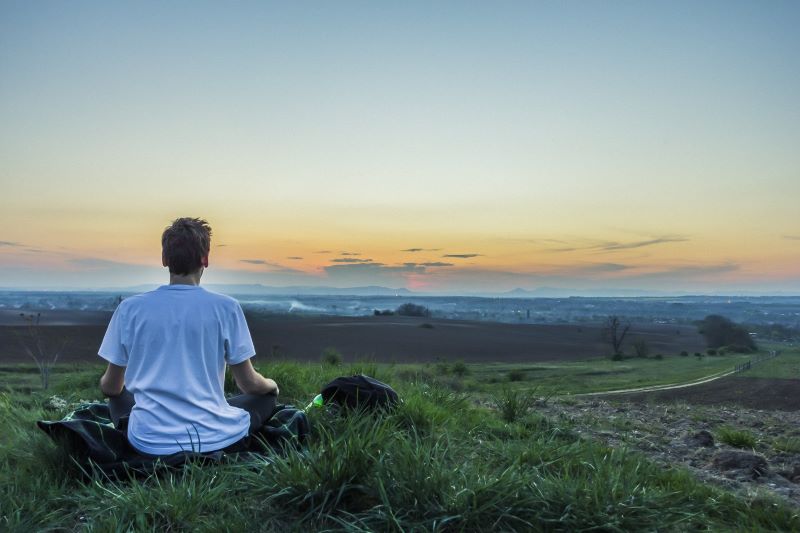Mindfulness has become very popular today, and for good reason. Over the past several decades, a wide body of research has shown that mindfulness-focused programs can be helpful for stress reduction and mental health.
With the increasing popularity of mindfulness programs, it is perhaps not surprising that we see stronger and stronger claims about the benefits of mindfulness. It is easy today to find that mindfulness can improve our decision-making, intelligence, and a range of other outcomes. There is a real risk, I think, that mindfulness may become the next easy fix, that we throw at every difficulty we face. Or, just another tool for self-improvement.
If we are interested in mindfulness because we want to support the well-being of ourselves and our communities, it is important to know what the benefits of mindfulness are (and also any costs, or risks, involved in mindfulness programs).
For the past several years, I have particularly been interested in looking at the relationship of mindfulness to cognition. As many established mindfulness programs, such as mindfulness-based stress reduction (MBSR), focus on helping people cultivate mindfulness, which Dr. Jon Kabat-Zinn defined as “the awareness that arises by paying attention on purpose, in the present moment, and non-judgmentally.”
MBSR and other mindfulness-focused programs use activities or practices that help people develop their ability to focus their attention in a non-reactive, nonjudgmental way. This practice appears to have impacts on one’s ability to regulate their emotions, and other outcomes. So, while the focus of a program like MBSR is on stress reduction (or stress resilience), some of the direct work is focused on thinking and emotion. For these reasons, it has seemed very likely to me that if mindfulness training programs are effective, this is at least partly through their effects on our patterns of thinking.
Mindfulness and decision-making
Back in 2013, a study by Drs. Andrew Hafenbrack, Zoe Kinias, and Sigal Barsade on the relationship between mindfulness and decision-making caught my attention. These researchers found that people who scored higher on a survey of mindfulness made better decisions than people who scored lower in mindfulness. Specifically, the researchers were looking at the sunk cost fallacy. This is a situation where we are more likely to stick with our plans when we have invested resources (money or time) that we cannot get back (i.e., those investments are “sunk” and cannot be recovered).
As an example, consider that you have tickets to a concert this evening, which you received for free. You’ve been looking forward to going out, but this afternoon, you started to have a painful headache. Now you would prefer to stay home and skip the concert. What will you do?

In this kind of situation, many people feel conflicted. On the one hand, they want to follow through with their plans, but on the other hand, if you don’t feel well, you may very well not enjoy the concert, so it could make sense to stay home. When faced with this kind of decision, some people will go out, and others will stay home, as you might expect.
What is very interesting, though, is to consider how our decisions would change if the tickets had not been free. And, especially if we cannot resell the tickets or get a refund. In this kind of situation, people who spend money for their tickets (especially if the tickets were expensive) are more likely to follow through and go to the concert, even if they don’t feel well. Not everyone will do so, but you will find that more people end out going out, even though they would prefer to stay home.
This difference – that people are more likely to follow through after investing money (or time) – is an example of the sunk cost fallacy, and how our decisions can be biased by sunk costs. And, this research suggested that mindfulness could help us to resist the impact of sunk costs (and thus make better decisions).
But, are sunk costs really the key?
And, reading about the research of Dr. Hafenbrack and colleagues, I found it fascinating to think that mindfulness might be able to weaken the impact of sunk costs on our decisions. But, I had one concern about the original study: were the researchers really looking at sunk costs specifically?
To say that mindfulness specifically predicts our ability to resist the pressure of sunk costs requires that we have a good measure of how our behavior is impacted by sunk costs. The easiest way to do that is to study how people behave under two conditions.
First, we want to see what people choose to do when they have not invested any (or very little) money or time. And then we want to see how those choices change if they have invested money or time (and, under conditions where they can’t get their time or money back – those costs are sunk, or lost, in that sense).
In the study by Dr. Hafenbrack and colleagues, many of the measures they used asked people to make decisions about situations where a significant amount of time or money had been invested. But, these measures lacked comparison conditions (asking people how they would have behaved if there had been little or no prior costs).
For example, consider this question from one of the surveys in the study:
You are buying a gold ring on layaway for someone special. It costs $200 and you have already paid $100 on it, so you owe another $100. One day, you see in the paper that a new jewelry store is selling the same ring for only $90 as a special sale, and you can pay for it using layaway. The new store is across the street from the old one. If you decide to get the ring from the new store, you will not be able to get your money back from the old store, but you would save $10 overall. Would you be more likely to continue paying at the old store or buy from the new store?
From the Resistance to Sunk Costs scale
In the survey, people are asked to indicate how likely they are to stick with the ring they have placed on layaway (and still owe $100) or to switch to buying the $90 ring from the new store.
If you are someone who wants to save money, then your best option in this case is to go ahead and buy the $90 ring from the new store (saving $10). Many people agree that they would buy the cheaper ring from the new store, which is no surprise.
It is surprising, though, that a number of people will not switch stores – these people say that they will pay the remaining $100 for the ring that is already on layaway. If you find yourself in this group, it may be that you are being influenced by sunk costs: the $100 that you have already spent for this ring.
But then again, maybe that is not the reason at all. Perhaps even if the original ring was only $100, and you had been able to put it on layaway with $0 down, you would have still have stuck with this ring, instead of switching over to the cheaper option.
Why would you do this? Well, maybe you feel a sense of commitment to the first store, where you have the ring on layaway. People do this all of the time, continuing some behavior, even though it is no longer the best course of action. Psychologists call this escalation of commitment. (Side note: to be honest, “escalation” seems to be an odd term to me in this context, especially since many cases of escalation of commitment are really just situations in which we are continuing some course of action. Personally, I would say inertia, or doubling-down, would be a better way to capture this kind of situation!)
To really determine if sunk costs impacted your decision to stick with the $100 ring on layaway, I need to know how much your behavior is influenced by that first $100 that you spent. And, the Resistance to Sunk Costs measure doesn’t really capture that piece (the specific impact of the initial investment).
This wrinkle in the story about mindfulness and sunk costs caught my interest, and I found myself wondering if we could get a clearer picture of how the impact of sunk costs was related to mindfulness. So, I decided to replicate the findings from the original paper, working with students in a course on research methods and statistics in psychology.
And, after searching the literature, I found a study by Dr. JoNell Strough and colleagues (paywall) of West Virginia University, who created a survey that assessed the impact of sunk costs. Their measure presented people with eight scenarios, each involving an investment of time or money.
To zero in on sunk costs, they present each scenario twice: once where people had made little or no prior investment, and once where people had made a large prior investment.
For example, here is one question from the low/no-investment version:
You have been working on a project related to one of your hobbies. You paid hardly any money at all for supplies. Lately, you have lost interest in the project. Whenever you work on the project, you are bored and wish that you were doing something else.
And, for the high investment version, they just changed one sentence: “…You paid hardly any money at all for supplies. …” becomes “… You paid a whole lot of money for supplies. …”
In the survey, the high and low/no investment versions were presented to each participant separately. For each scenario, people indicate how long they are likely to continue this behavior (do they think they will finish the project? Will they continue for a while? Will they quit the project immediately?). For this scenario, a person who is influenced by sunk costs should say that they will stick with the project longer if they have invested “a whole lot of” money in supplies (compared to “hardly any” money).
Across several small studies, my students and I were able to replicate the main findings from the original study (and here is the published version of the paper). People who scored higher on survey measures of mindfulness were less sensitive to sunk costs: spending money for supplies did not seem to make them more likely to stick with a project that they had no interest in. I will say, though, that this relationship was a bit weak using the survey developed by Strough and colleagues: we didn’t see a significant relationship between sunk costs and mindfulness in all of our studies.
We also made one new discovery: that people who reported higher levels of mindfulness were more willing to give up on an activity, even when they had not invested much time or money (even when they had not invested money for supplies, they were more willing to quit a project that they were no longer interested in). This relationship was stronger than the effect for sunk costs, suggests that mindfulness is not just related to a reduction in the effects of sunk costs, but also to less escalation of commitment.
It appears that more mindful individuals were less likely to “double-down” on a course of action that they were no longer interested in. And, we considered this to be another way that mindfulness was related to making better decisions.
What does it all mean?
These two studies – the original by Dr. Hafenbrack and colleagues, and our replication – are good examples of how psychology research can help us better understand mindfulness. But you might wonder, what does it really mean for our daily lives?
Overall, I think we have strong evidence people who score higher in mindfulness (as a trait) will also say they are more willing to give up on something (a plan, an activity, a relationship) that they no longer find valuable. Another way to say this is that more mindful people may be less likely to double down or throw good money after bad.
And, on average, this is probably a positive thing. While it is often good to be able to stick with our plans and see our commitments through, we may also value being flexible enough to make a change if it turns out that our plans are no longer in our best interest.
Will mindfulness training help me make better decisions?
Based on this research, we might hope that cultivating mindfulness (through meditation or mindfulness-based interventions) could help us be more resistant to sunk costs or doubling down.
But, the studies described above are mostly correlational: we see that people who are more mindful make better decisions, but we don’t know if developing mindfulness further would help people better resist sunk costs or escalation of commitment.
Dr. Hafenbrack and colleagues did test a short-term mindfulness induction, and found that increasing mindfulness helped people give up on an undesirable course of action. We struggled to replicate this specific finding (mainly because the short-term mindfulness induction didn’t work in our study). Overall, I think it is reasonable to expect that interventions that increase mindfulness would decrease the impact of sunk costs and escalation of commitment, but I can’t say that we have firm evidence in this area: it is a reasonable expectation that hasn’t been thoroughly tested in the world.
For this reason, I really would not recommend that people promote mindfulness-based training programs as proven ways to specifically target the sunk cost bias or escalation of commitment.
Coming back to our practice
And, even if it does turn out that mindfulness-based programs can produce these changes, that would be interesting, but not necessarily very useful for us once we have taken up a practice that involves mindfulness.
To really commit to a practice of mindfulness asks of us to be aware of the trap of turning practice into just another tool for self-improvement. If we are not careful, it can be very easy to slide away from a focus on our direct experience, and to move to but judging, ranking, and living in the fantasy of a future in which we are a “better” person.
To really commit to mindfulness, to living in an “awareness that arises by paying attention on purpose, in the present moment, and non-judgmentally,” we need to be aware of all of the ways that we can get caught up in chasing after our goals, or get lost in dreams. And commit to waking up anew each time we find that we’ve lost the thread of the present moment.


